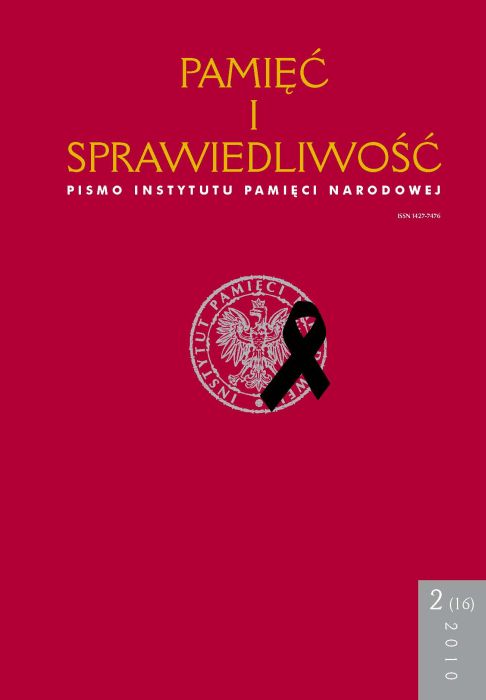Nauka, polityka i tajne służby. Podróże Adama Bromkego do Polski
Pamięć i Sprawiedliwość, Tom 16 Nr 2 (2010), strony: 339-352
Data publikacji: 2010-12-30
Abstrakt
Adam Bromke, known Canadian political scientist of Polish origin, was born in 1928, in Warsaw. During World War II he belonged to the Home Army and actively fought in the Warsaw Uprising of 1944. He left Poland in 1945. He was an activist of the National Party in exile. Between 1955–1956 he conducted the National Committee for a Free Europe’s “balloon campaign” in Poland. In the following years Adam Bromke worked at many Canadian universities. In his researches he was concentrated on the situation in Communist countries in Central and Eastern Europe. In 1961, after 16-year absence, he came to visit Poland with the intention of collecting material for a new book and establishing contacts with Polish scholars. He quickly became an object of interest to/of the PRL’s intelligence service. He refused to pass on any information about other people (especially those of Radio Free Europe) to the intelligence service. However, he was willing to establish political contacts with Ministry of Foreign Affairs (the MSZ, Ministerstwo Spraw Zagranicznych). The intelligence, carrying out operational activity towards Bromke, used his friend from the conspiracy – Wojciech Sokolewicz, an employee of the Institute of Law Studies of Polish Academy of Science (the INP PAN, Instytut Nauk Prawnych Polskiej Akademii Nauk). Simultaneously, Adam Bromke treated him as a mediator enabling conducting political talks with the PRL’s authorities – initially with the MSZ, then with the MSW (Ministerstwo Spraw
Wewnętrznych, Ministry of Internal Affairs). Bromke wanted to be regarded as a political partner, an expert, not an ordinary informant. During the following visits to Poland (in 1964, 1968 and 1969) he was ready to come into confidential contacts with the MSW’s leaderships (he did not manage to meet with Minister
Mieczysław Moczar). What was his aim? Was he only a political analyst? As a well-known and highly regarded expert in the West, he probably wanted to have an access to the high-ranking PRL’s officials. Did he consider it probable that once the importance of Poland’s “Partisans” increased he would exert an “backstage”
influence on their activity? Whenever being under the PRL’s intelligence service’s pressure, Bromke consequently refused to get involved himself in secret collaboration. He came to Poland several times, in the 1970s and 1980s. He also used to meet with the representatives of the PRL’s authorities. During that period, he was no longer under the Secret Service’s surveillance. What is more, he consciously played an opinion-forming role. His books and articles published in prestigious journals were watering down Western intellectual elites’ opinion on Communist rule in Poland and in Central-Eastern Europe. He was widely criticized
by “Paryska Kultura” and Radio Free Europe for his openly presented view as well as for his activity in general.
In 1988, Bromke settled permanently in Poland where he became a professor at the newly established Institute of Political Studies, Polish Academy of Science. He died in Warsaw, in 2008.
Inne teksty tego samego autora
- Krzysztof Tarka, „Jest typem dość sympatycznym”. Józef Retinger i wywiad cywilny PRL , Pamięć i Sprawiedliwość: Tom 35 Nr 1 (2020)
- Antoni Józef Bohdanowicz, Władysław Bułhak, Andrzej Friszke, Małgorzata Ptasińska-Wójcik, Krzysztof Tarka, [Dyskusja] Stan badań nad emigracją i źródła do jej dziejów , Pamięć i Sprawiedliwość: Tom 15 Nr 1 (2010)
- Krzysztof Tarka, Działalność Karola Lewkowicza – przyczynek do powstania orientacji prokrajowej na emigracji , Pamięć i Sprawiedliwość: Tom 15 Nr 1 (2010)
- Krzysztof Tarka, Waldemar Sobczyk i „Nasz Znak” – dywersja w ruchu ludowym na emigracji , Pamięć i Sprawiedliwość: Tom 18 Nr 2 (2011)
- Krzysztof Tarka, Anna Cichocka, [Recenzja] Krzysztof Tarka, Emigracyjna dyplomacja. Polityka zagraniczna rządu RP na uchodźstwie 1945–1990, Oficyna Wydawnicza RYTM, Warszawa 2003, ss. 315 , Pamięć i Sprawiedliwość: Tom 6 Nr 2 (2004)
- Krzysztof Tarka, Reglamentowana odwilż. Obóz "zamkowy" na emigracji wobec wydarzeń w Polsce i bloku komunistycznym w 1956 roku , Pamięć i Sprawiedliwość: Tom 28 Nr 2 (2016)
- Krzysztof Tarka, Jest tylko jedna Polska. Bolesław Świderski – emigrant w służbie Polski Ludowej , Pamięć i Sprawiedliwość: Tom 11 Nr 1 (2007)
- Krzysztof Tarka, W oczekiwaniu na wyzwolenie. Rząd Rzeczypospolitej Polskiej na uchodźstwie o sytuacji międzynarodowej na przełomie lat czterdziestych i pięćdziesiątych , Pamięć i Sprawiedliwość: Tom 2 Nr 2 (2002)
 Język Polski
Język Polski
 English
English
 Deutsch
Deutsch
 Français (France)
Français (France)
 Italiano
Italiano
 Русский
Русский


 PDF
PDF
